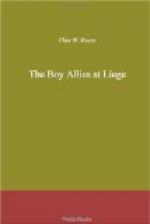While the packing is going on, it is a good time to describe the two American lads, who will play the most important parts in our story.
Hal Paine was a lad some seventeen years of age. Following his graduation from high school in a large Illinois city the previous June, his mother had announced her intention of taking him on a tour through Europe. Needless to say, Hal jumped at this chance to see something of the foreign countries in whose histories he had always been deeply interested. It was upon Hal’s request that Mrs. Paine had invited his chum, Chester Crawford, to accompany them.
Chester was naturally eager to take the trip across the water, and, after some coaxing, in which Mrs. Paine’s influence also was brought to bear, his parents finally agreed to their son’s going so far away from home.
Hal’s father was dead. A colonel of infantry, he was killed leading a charge at the battle of El Caney, in the Spanish-American war. Hal’s grandfather died of a bayonet wound in the last days of the Civil War.
But, if Hal’s father’s family was a family of fighters, so was that of his mother. Her father, a Virginian, was killed at the head of his men while leading one of Pickett’s regiments in the famous charge at Gettysburg. Three of her brothers also had been killed on the field of battle, and another had died in prison.
From her own mother Mrs. Paine had learned of the horrors of war. Before the war her father had been a wealthy man. After the war her mother was almost in poverty. While too young then to remember these things herself, Mrs. Paine knew what havoc had been wrought in the land of her birth by the invasion of armed men, and it is not to be wondered at that, in view of the events narrated, she should view the coming struggle with anguish, despite the fact that her own country was not involved and that there was no reason why her loved ones should be called upon to take up arms.
Chester’s father was a prominent and wealthy lumberman, and Chester, although nearly a year younger than Hal, had graduated in the same class with his comrade. The two families lived next door to each other, and the lads had always been the closest of chums.
For the last three years the boys had spent each summer vacation in one of the lumber camps owned by Chester’s father, in the great Northwest. Always athletically inclined, the time thus spent among the rough lumbermen had given the boys new prowess. Day after day they spent in the woods, hunting big game, and both had become proficient in the use of firearms; while to their boxing skill—learned under a veteran of the prize-ring, who was employed by Chester’s father in the town in which they lived—they added that dexterity which comes only with hard experience. Daily fencing lessons had made both proficient in the use of sword and saber.
Among these woodsmen, composed of laborers from many nations, they had also picked up a smattering of many European languages, which proved of great help to them on their trip abroad.




